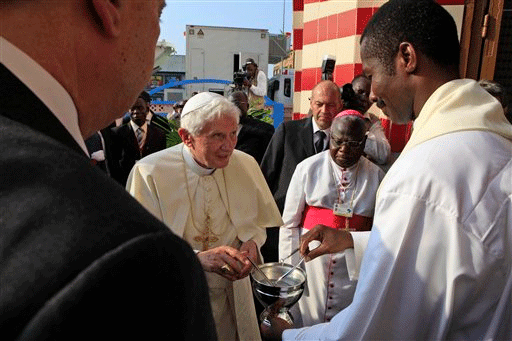
Nov. 18: Pope Benedict XVI is accompanied by Archibishop of Cotonou Antoine Ganye, center right, as he performs a ritual upon arriving at Notre Dame cathedral in Cotonou, Benin. Catholics wearing colorful dresses printed with his image greeted him Friday as he embarked on his second trip to Africa, where he plans to outline the church's future for the continent with the fastest growing number of faithful. (AP)
COTONOU, Benin – Women wearing dresses bearing Pope Benedict XVI's portrait tried to climb flagpoles to catch a glimpse of him as he arrived Friday on his second trip to Africa, while security struggled to hold back African nuns trying to reach over the cordon to touch him.
Africa, where the 84-year-old pope is returning for the first time since his controversial comments on condoms two years ago, is the fastest-growing region for the Roman Catholic Church. Its rapidly growing congregations and pool of aspiring priests is helping breathe life into a church which has seen a steep decline in the Western hemisphere.
Several hundred women lined the tarmac awaiting his arrival, wearing dresses with his face on them. Supporters from each parish wore a different color headscarf -- blue, green, red and yellow. The faithful tried to shield their faces from the blazing sun as temperatures reached 90 degrees.
Catholics carrying umbrellas printed with his silhouette lined the highway. Some wept as he emerged from the airport encased in the bulletproof glass case on top of his popemobile.
On this trip, he plans to outline the church's future for the continent.
Even in Benin, the heartland of the voodoo tradition, the number of Catholics has grown by nearly half in the past decade, adding more than half-a-million converts at the same time when congregations are declining in Europe.
Benedict's first trip to Africa two years ago was overshadowed by his controversial comments, when he drew criticism on this continent ravaged by HIV/AIDS for saying that condom distribution was increasing the problem. This time the pope is hoping to present a document on how church doctrine can be used to solve the continent's ills, drawing on ideas provided by African bishops themselves.
"May this document fall into the ground and take root, grow and bear much fruit," the pope said upon arrival.
The guide is based in part on the 57 recommendations of the 2009 synod, where bishops met to articulate the church's role in Africa.
"Modernity need not provoke fear, but neither can it be constructed by neglecting the past," he said. "It needs to be accompanied by prudence for the good of all in order to avoid the pitfalls which exist on the African continent and elsewhere," he said Friday.
Among the recommendations in the document is a "sacrament of reconciliation" which will use the church's dogma of forgiveness as a tool to try to resolve violence. In remote parts of Africa where there are no courts and no police force, communities have often created their own rituals of reconciliation. One of the proposals that may be included in the papal document is to do an in-depth study of these practices in order to try to learn from them.
Priests who have traveled from neighboring countries to see the pope say that the idea of looking to African traditions shows that the Catholic faith has become more supple since colonial times, when becoming Christian meant turning your back on tradition.
Cameroonian priest the Rev. Jean Benoit Nlend says that among his country's Bassa people, numerous rituals have been created to deal with life's conflicts. If a man beats his wife and she returns to her parents' home, the husband can only get her back if he comes with plates of food, and negotiates a cash amount to be paid to her kin in reparation.
"In my seminary in Cameroon, we went around the table and talked about the types of rituals our ancestors performed to fix problems that arose in the society. If you try to destroy these things, you render the people fragile. You take away their moral coordinates," said Nlend, an editor at Cameroon's Episcopalian publication.
"Catholicism is a much more supple religion now than it once was. The church shouldn't try to chase away African culture. What it needs to do is act like a sieve, and remove only the things that don't help human beings evolve," he said.
Because of this more supple attitude toward African culture, Catholicism is booming on the continent. Africa has become the world's feeder church, said Catholic scholar Lamin Sanneh, a Yale Divinity School professor who is from the African nation of Gambia.
"Europe is now looking to Africa to replenish its churches. In France, the most famous Catholic seminary has more priests in training from Africa than from all of Europe," said Sanneh, who is himself a native of Gambia, a small nation north of Benin.
The Rev. Andre Quenum, the publisher of main Catholic weekly in Benin, says Africans have been particularly drawn to the church's teachings because of the that poverty and violence that have wracked the continent.
"One of the consequences of modernity in Europe is that people have been able to solve many of the problems of daily life. If you fall sick you can go to a clinic," he said. "Here when you get sick, you could very well die. So we put our problems in God's hands," he said. "And this is where the pope has seen our potential."
